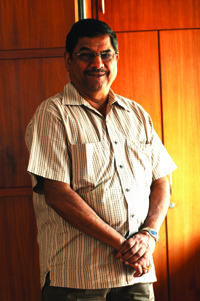Smart City and Sustainability
 |
Conceptualisation and implementation of a Smart City is cherishing urban life without coercing natural resources. It calls for adopting several measures that are workable and yet, sustainable in the sphere of infrastructure for mobility, housing, energy, networking, water supply, sewage facilities, solid waste management and pollution control systems.
Urbanization in the present scenario is inevitable and also an indicator of economic growth. On flipside, we also have to accede to the actualities of urban cities contributing to the pollution. As Terri Swearingen, noted environmentalist puts it, “We are living on this planet as if we had another one to go.” |
The need of the hour is to address these issues on priority keeping the impact of built environment on natural environment minimal. It is heartening to know that GOI has initiated steps in this direction by identifying a few cities to be developed as Smart Cities.
Even though, Smart Cities consider technology as a focal point, we need additional set of innovative technologies including smart grid, renewable energy sources, new types of fuels for transports and energy efficient materials and energy saving construction methods for building construction. By shifting to these changes, we can therefore be optimistic of converting existing cities to smart cities.
A quote by noted architect, Bob Berkebile, USA aptly fits the situation, “The best of our current designs are obsolete in a world that is, and will increasingly be, significantly more crowded and hot with enormous competition for resources. It is time to create structures that are biometric, stronger, more durable, resource conserving, climate positive and above all beautiful”.
Global warming is a reality today. Our planet is hotter than it has been in few hundred years ago. According to broad scientific consensus, humanity is a major contributor to this climate change. Hence, the choices we make today will decide the climate of the future. The fundamental points in design and development of smart cities would outline the environmental sustainability as well. We have to insist all the stakeholders of smart cities development to follow on minimizing life cycle costs, reducing resource consumption, reducing resource waste and recycling, providing onsite renewable energy sources. Alongside we need to ensure 100% waste water recycling, wind towers, non-toxic paints and sealants, 60% roof garden area and minimum site disturbances in building construction.
Emphasis on energy saving is a key element in smart cities development. Wise planning of land use paves way as solution for decongesting existing cities. For instance, locating industries at the periphery and housing requirements of the employees of these industries can be a viable option to reduce travel distance. A revolutionized transport system must be brought in that involves efficient public transport system and usage of alternative fuels in vehicles. Parking places at strategic locations not only eases traffic congestion but minimizes Carbon footprint as well.
Information and communication technology plays is an integral component of making the city function better. Energy efficiency through smart metering systems, time of day pricing can reduce peak time demand. By integrating Internet of Things (IoT) and free WiFi, improved and planned physical infrastructure can alchemise how cities can work thus, developing them as 'smart'.
Cities are the most relevant component of the demographic and economic growth of our country, however, with the current crisis scenario with limited resources there is an urgent need to develop a systemic innovation capacity without which there will not be any social, economic and environmental development of urban ecosystem. Therefore, development of smart cities may counter this challenge. Though seems unattainable at the macro level, yet achievable through smart planning! As final note, smart initiatives revolve around the idea that inhabitants use their city resources wisely in order to live and grow sustainably. To make urban areas more viable to citizens and the environment, India must build new smart cities and recondition the old ones.
R. SUNDARAM
Chairman & Managing Director - Sundaram Architects Pvt. Ltd.
President - Structural Engineers World Congress-Inc. Worldwide [ SEWC Inc. ]
President - Structural Engineers World Congress – India.
No: 19 Kumara Krupa Road, Bangalore – 560 001, India.
Tel: 0091-80-22380701/22380702/22265507
Fax: 0091-80-2225 2339 E-mail: edp@sundaramarchitects.com